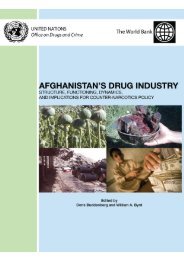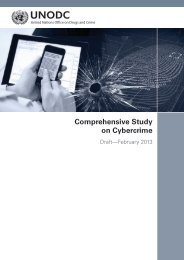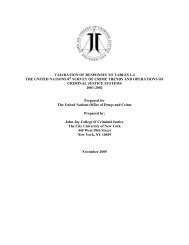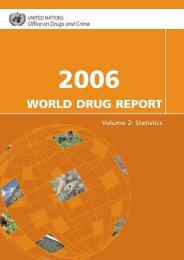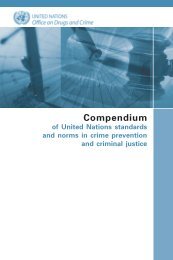Manual for Training Police on Anti Human Trafficking
Manual for Training Police on Anti Human Trafficking
Manual for Training Police on Anti Human Trafficking
Create successful ePaper yourself
Turn your PDF publications into a flip-book with our unique Google optimized e-Paper software.
<str<strong>on</strong>g>Manual</str<strong>on</strong>g> <str<strong>on</strong>g>for</str<strong>on</strong>g> <str<strong>on</strong>g>Training</str<strong>on</strong>g> <str<strong>on</strong>g>Police</str<strong>on</strong>g> <strong>on</strong> <strong>Anti</strong> <strong>Human</strong> <strong>Trafficking</strong> 70<br />
Knowledge of the topic – In order to c<strong>on</strong>vey a clear purpose and objectives of the facilitati<strong>on</strong>, it is<br />
important to have and dem<strong>on</strong>strate c<strong>on</strong>fidence in your knowledge of the topic of human trafficking in<br />
the facilitati<strong>on</strong> sessi<strong>on</strong>. Being knowledgeable about human trafficking as well as being aware of the<br />
issues surrounding HT should be reflected in an ability to transmit such knowledge by speaking with<br />
cohesi<strong>on</strong> and clarity. The self-assurance that you, as the facilitator, display, the more likely you are to<br />
engage the participants, and thereby further the learning process.<br />
Communicati<strong>on</strong> skills – For a facilitator, having command over both verbal and n<strong>on</strong>-verbal communicati<strong>on</strong><br />
skills is an important prerequisite. Communicati<strong>on</strong> includes both effective speaking as well as listening.<br />
Listening is no less important than speaking when it comes to engaging in human interacti<strong>on</strong> and<br />
building trust and sensitivity in human relati<strong>on</strong>ships. It is especially important as a facilitator that<br />
patient listening is practiced with the participants. This quality must also seep into the trainees’ interacti<strong>on</strong><br />
with the victim/survivors of trafficking.<br />
Clarity of expressi<strong>on</strong> – You must always try to present your thoughts in precise and coherent manner<br />
otherwise participants may become c<strong>on</strong>fused or may lose interest.<br />
As a trainer/facilitator, you can simply begin by organizing and planning <str<strong>on</strong>g>for</str<strong>on</strong>g> your training <strong>on</strong> AHT by<br />
dividing it into the following three parts <str<strong>on</strong>g>for</str<strong>on</strong>g> purposes of simplicity and clarity:<br />
1) pre-training 2) during-the-training 3) post-training<br />
2. PRE-TRAINING<br />
For each of these, separate activities and tasks need to be undertaken. During the pre-training stage you<br />
need to be clear about what do you want to communicate <strong>on</strong> the issue of AHT. It may actually be helpful<br />
to work backwards and start from what you want as an outcome at the end of each sessi<strong>on</strong>. You can then<br />
accordingly build your sessi<strong>on</strong>s plan.<br />
Finalizing the training resource material or reading material that you wish to share with your participants<br />
should also be d<strong>on</strong>e in the pre-training stage. The specific learning needs assessment must be undertaken<br />
to make the training both focused and meaningful. The following seven steps to plan your training<br />
successfully may aid you in the facilitati<strong>on</strong> process:<br />
Seven Steps of Planning 46<br />
WHO is the course designed <str<strong>on</strong>g>for</str<strong>on</strong>g>? How many will attend? C<strong>on</strong>sider their levels of experience, likely<br />
ages, gender, vocati<strong>on</strong>al specializati<strong>on</strong> etc. What is their level of understanding and awareness regarding<br />
human trafficking issues. What is their likely level of motivati<strong>on</strong> to partake in AHT training?<br />
WHY do these people need training? How is AHT training related to the participants’ job resp<strong>on</strong>sibilities.<br />
Is the timing relevant – are there new techniques, policies, guidelines or particular issues/challenges<br />
that have arisen c<strong>on</strong>cerning AHT research/HT cases?<br />
WHAT OUTPUT is expected from the participants in terms of skill and knowledge gain? What impact<br />
do you hope the facilitati<strong>on</strong> sessi<strong>on</strong> will have <strong>on</strong> the participants’ behaviour? What kind of attitude<br />
– by the facilitator, and the participants – is required to imbibe this learning and facilitate this<br />
change?<br />
WHEN will the training take place? How l<strong>on</strong>g will it last? Keep in mind participants’ work commitments.<br />
Would <strong>on</strong>e block of time be suitable or would a series of separate sessi<strong>on</strong>s be better suited to the<br />
participants’ schedules?




